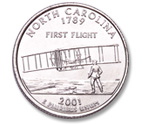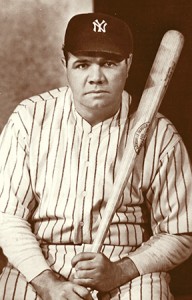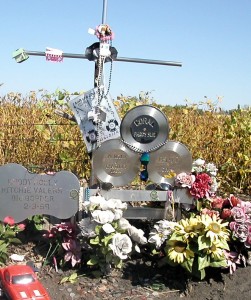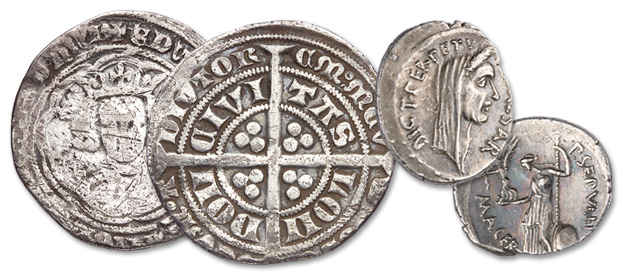Call it! Heads or Tails…
7 Decisions made by the flip of a coin…
Heads or Tails, Capita aut Navia, Cross or Pile… it’s all the same – calling the side the coin will land on to decide something dates back thousands of years! Coin tosses have been used to gamble, break ties, settle disputes, decide who will go first or make a decision. And, here are some historic outcomes settled by a simple toss of the coin.
- Portland or Boston? In 1845, Asa Lovejoy from Massachusetts and Francis Pettygrove from Maine couldn’t decide what to call the new settlement nestled between the Willamette and Columbia Rivers. So they flipped a coin and the area became Portland, after Pettygrove’s former hometown.
 Wilbur or Orville? At Kitty Hawk, NC in 1903, the Wright brothers’ plane The Flyer was ready for flight. But who would go first? A toss of the coin decided… Wilbur won, and on December 14th he took off, staying aloft about 3 seconds before the plane stalled and crashed. That’s why Orville’s flight, 3 days later, is considered the first successful powered flight, and why today that scene is captured on the North Carolina state quarter.
Wilbur or Orville? At Kitty Hawk, NC in 1903, the Wright brothers’ plane The Flyer was ready for flight. But who would go first? A toss of the coin decided… Wilbur won, and on December 14th he took off, staying aloft about 3 seconds before the plane stalled and crashed. That’s why Orville’s flight, 3 days later, is considered the first successful powered flight, and why today that scene is captured on the North Carolina state quarter.-

Babe Ruth
The Bambino – $50K or $52K? The contract that sent Babe Ruth to the Yankees in 1919 from Boston had expired. So in the spring of 1922, he entered negotiations with co-owner of the New York Yankees, Colonel T. Huston. They were close on salary, but couldn’t agree on the exact amount – the Yankees offered $50,000 and the Bambino countered with $52,000. A half dollar spun through the air and Babe called “tails.” When it landed, he got his $52K and wore pinstripes another 3 years.
- The Hall or the bench? The destinies of basketball legends and Hall‑of‑Famers Magic Johnson and Michael Jordan were determined by a flip of the coin. With one half revolution more or less – they might have been sent to different teams – the careers of these gentlemen and the history of the NBA might have turned out differently.
- Bunbury or Derby? The horse racing moniker “derby” began in 1780. The 12th Earl of Derby hosted a successful 1½‑mile race for fillies in Epsom, England in 1779. Later, he and fellow horseracing enthusiast Sir Charles Bunbury decided to hold a similar event for colts… but who to name it after? History tells us who won the coin toss – after all, Kentucky Bunbury doesn’t have the same ring as Kentucky Derby!
- The Bride or Secretariat? Penny Chenery lost the coin toss but won in the end. The Phipps and Chenerys agreed to breed their horses – the Phipps’ stud with 3 of Chenery’s mares. A coin flip in 1969 sealed the deal. Phipps won and got first dibs, taking The Bride. Penny Chenery got the second choice that year, but first choice the next, and in 1970, Secretariat was born.
-

Crash site memorial
Fly or Ride the Bus? Snowy, cold temperatures in Iowa, plus a tour bus that kept breaking down, caused Buddy Holly to rent a 4-seater plane. The pilot and 3 band members would fly to Fargo, ND. Waylon Jennings gave up his seat to “The Big Bopper,” J.P. Richardson, who was sick, and stories say Richie Valens and Tommy Allsup flipped a coin to see who would get the last seat. The plane crashed shortly after take off and Holly, Richardson and Valens died on impact – this day became known as “The Day the Music Died.”
Tales indicate the coin toss began during the Roman Republic. There, when flipping a coin, one called out Capita or Navia, which meant heads or ships. The bronze As, issued between 211-82 B.C., was the coin of choice. It showed the two-headed god Janus on one side and a ship’s prow on the other. After Julius Caesar placed his portrait on coins in 44 B.C., supposedly the Senate flipped a coin to make decisions when Caesar was absent from proceedings. If the coin landed with Caesar’s portrait up, it meant the gods were saying that he agreed with their decision.

Edward III Groat with cross on the left, coinage of Julius Caesar on the right.
In Medieval England, people played the game of chance called cross and pile. A coin was tossed in the air and players called out either “cross” or “pile” before it hit the ground. The winner who called it correctly kept the coin. Back then some English coins displayed a cross on one side and the ruler’s portrait on the other. Through the ages coin tosses have settled many disputes and were used to make decisions, even today it’s used in one of America’s greatest sporting events ever – the Super Bowl!



